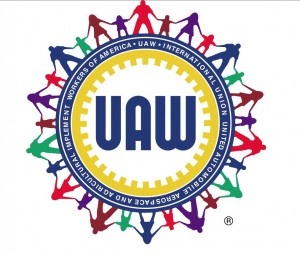
Now that the UAW has authorized a strike, speculation about which FCA facilities will be targeted focuses on Jeep sites.
If the negotiators can’t come close to working out terms of a new contract proposal, the United Auto Workers is likely to target three key FCA U.S. plants, including the Jeep complex in Toledo, Ohio, for possible local strikes, according to sources familiar with the UAW’s evolving strategy.
Unless the two sides can break the impasse by 11:59 p.m. tonight, the trans-Atlantic automaker could be hit by the first major walkout in the auto industry since well before the start of the devastating recession that sent the former Chrysler Corp. into bankruptcy.
“FCA US confirms that it has received strike notification from the UAW,” the maker said in a brief statement released Tuesday afternoon. “The company continues to work with the UAW in a constructive manner to reach a new agreement.”
As the two side continue discussion, the union has let talk of a more expansive general strike percolate through the plants, but the union also has apparently sent more specific instructions to union local at the FCA transmission plant in Kokomo, Indiana, the Toledo Machining Plant in Perrysburg, Ohio, and the Jeep complex in Toledo.
A strike at the Toledo complex would be particularly damaging to FCA U.S. because the company would not be able to replace any of the Jeep Wranglers lost in a work stoppage. The Wrangler is one of the company’s most popular vehicles and the company would be hard pressed to replace the units by building additional units on over time after a work stoppage.
(UAW ready to strike at Fiat Chrysler. For more, Click Here.)
While it has escalated the pressure on FCA’s management by notifying the company’s negotiators that the current contract extension would expire at midnight. While the union can strike once the extension does expire, it’s still not clear the union will follow through with a partial or full-blown strike.
While a strike in Toledo would quickly cost the FCA a substantial amount of cash almost immediately, a walkout in Kokomo would gradually shut down almost all of FCA’s assembly plants in North America over the course of about 10 days.
(For more on why UAW members said “no,” Click Here.)
The talk of a strike, which UAW president Dennis Williams has said would represent a failure by both sides, follows the overall rejection of a tentative agreement reached last month. The rejected contract did not offer a path to first tier wages for all of FCA’s blue-collar workers, who want to see the two-tier system that now prevails in the company’s plants eliminated for good.
Sergio Marchionne, FCA’s chief executive officer, has said he wants to eliminate the two-tier system as well but his method for eliminating the pay gap was to phase out the first-tier wage, which now stands at $28 per hour, compared to the $16.50 paid second-tier workers.
(What was in the original FCA contract offer? Click Here to find out.)
The rejection of the first tentative agreement was so decisive that union leaders may no choice but to press for changes that will require FCA to make the next contract proposal richer all the way around.
